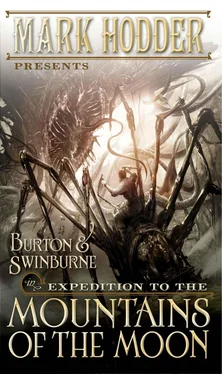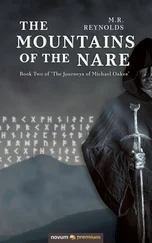Mark Hodder - Expedition to the Mountains of the Moon
Здесь есть возможность читать онлайн «Mark Hodder - Expedition to the Mountains of the Moon» весь текст электронной книги совершенно бесплатно (целиком полную версию без сокращений). В некоторых случаях можно слушать аудио, скачать через торрент в формате fb2 и присутствует краткое содержание. Жанр: sf_stimpank, на английском языке. Описание произведения, (предисловие) а так же отзывы посетителей доступны на портале библиотеки ЛибКат.
- Название:Expedition to the Mountains of the Moon
- Автор:
- Жанр:
- Год:неизвестен
- ISBN:нет данных
- Рейтинг книги:5 / 5. Голосов: 1
-
Избранное:Добавить в избранное
- Отзывы:
-
Ваша оценка:
- 100
- 1
- 2
- 3
- 4
- 5
Expedition to the Mountains of the Moon: краткое содержание, описание и аннотация
Предлагаем к чтению аннотацию, описание, краткое содержание или предисловие (зависит от того, что написал сам автор книги «Expedition to the Mountains of the Moon»). Если вы не нашли необходимую информацию о книге — напишите в комментариях, мы постараемся отыскать её.
Expedition to the Mountains of the Moon — читать онлайн бесплатно полную книгу (весь текст) целиком
Ниже представлен текст книги, разбитый по страницам. Система сохранения места последней прочитанной страницы, позволяет с удобством читать онлайн бесплатно книгу «Expedition to the Mountains of the Moon», без необходимости каждый раз заново искать на чём Вы остановились. Поставьте закладку, и сможете в любой момент перейти на страницу, на которой закончили чтение.
Интервал:
Закладка:
“Will we remember anything?”
“That, Maneesh, is a question I can't answer. Perhaps each individual's subjective apprehension of the world will readjust, returning to the original version of history.”
“And you, Sir Richard? Won't you exist twice in the same time? How old were you in 1840?”
“Nineteen. I don't know what will happen to me. I'll deal with it when I get there.”
Burton watched as Speke was escorted to one of the benches and lay down on it. Two Technologists affixed cables from the contraption above to the lieutenant's babbage.
“They are ready for you,” Brunel said.
Burton took a deep breath. Holding his arm pressed to his injured side, he paced over to the bench beside Speke and gingerly positioned himself on it. He put the Lee-Enfield rifle down with its barrel resting on his shoulder.
Krishnamurthy crossed to another worktop and returned from it with the portmanteau and the jewel case. He placed them on Burton's chest and stomach. The explorer wrapped his arms around them.
“Good luck, sir,” the police commander said. He moved to the end of the benches where the horse had been tethered, took hold of the animal's reins, and drew his police-issue Adams revolver.
Countess Sabina stepped closer to Speke.
The machine overhead began to hum.
“Is everyone in position and prepared?” Brunel piped loudly.
The gathered technicians answered in the affirmative.
Burton rolled his head to the side and said to Speke: “John. Thank you.”
Speke looked back and gave a sad smile.
Brunel clanked over to a console and began to adjust levers and dials.
The apparatus hanging over the benches suddenly hummed-a deep, throbbing sound-and bolts of blue energy fizzed and spat across its surface.
“Now, please, Mr. Speke,” Brunel said.
The lieutenant reached up to the key that poked out over his left ear and began to wind the babbage.
“I just felt the booby trap arm itself,” he muttered. “Maybe thirty minutes, then it'll explode.”
Countess Sabina said, “Try to remain calm, please, Mr. Speke. I'm establishing a mediumistic connection with you now.”
She flinched, gasped, and whimpered: “Oh, you poor thing!”
“I can feel your presence,” Speke groaned. “It's-it's-”
“Intrusive? I know, sir. I'm sorry.”
“I'm awaiting your word, Countess,” Brunel said.
“Not yet!” The woman put her fingertips to her temples and squeezed her eyes shut. “I can sense the diamonds. I have to feel my way into them. Follow me, if you can, Mr. Speke. I'm trying to connect with your mind, too, Sir Richard.”
Burton felt his scalp crawling, as if insects were running over it.
“Power's building!” Brunel called. “Hurry!”
From head to toe, Burton's muscles suddenly locked tight. Pain shot through his side. He cried out.
“Now!” the countess screamed.
A jagged line of blue lightning shot out of the overhead machine, hit Speke's babbage, and jumped across to Burton's head. The king's agent screeched and jerked as his nerve endings seemed to catch fire.
“Krishnamurthy!” Brunel shouted.
The Flying Squad commander pushed his pistol against the horse's head and pulled the trigger. The animal collapsed.
Burton convulsed and began to lose consciousness.
“It hasn't worked!” Krishnamurthy shouted. “Turn off the power! You're killing them!”
“No!” the countess shrieked. She threw out her arms. Blood welled up in her eyes and ran down her cheeks. “It's me! I'm the sacrifice!”
“Countess!” Krishnamurthy yelled.
The cheiromantist flopped to the floor.
There was a flash of white light.
Sir Richard Francis Burton remembered his youth and his first independent visit to London. He'd been there before-he'd gone to school in Richmond when he was eight years old-but on this occasion he was nineteen, had come from Italy to enrol at Trinity College, Oxford, and was filled with grandiose ideas and a bottomless well of self-esteem.
As is so often the case with memories, they were conjured by his olfactory sense. His nostrils were filled with the gritty carbon smell of soot, the rotten stench of the Thames, the stale odours of unlaundered clothes and unwashed bodies, all lurking behind the powerful tang of grass.
Grass?
He opened his eyes. He was lying facedown in long grass at the edge of a thicket of trees. A man had just emerged from them and, not noticing Burton, was walking away, down a slope. The explorer heard him mutter: “Steady, Edward! Hang on, hang on. Don't let it overwhelm you. This is neither a dream nor an illusion, so stay focused, get the job done, then get back to your suit!”
Bismillah! That's Edward Oxford!
He was too late! He hadn't counted on losing consciousness. He'd intended to shoot the visitor from the future among the trees before making a fast getaway. What now?
Burton pushed himself to his knees and almost cried out as his ribs scraped against each other. He reached for his rifle, the jewel case, and portmanteau-all on the grass beside him-picked them up, and crawled into the thicket. He found a suitable spot, lay flat, and carefully-gritting his teeth against the pain-pulled himself forward until he was hidden beneath a bush. He looked out at Green Park.
Tick tick tick.
He could feel John Speke's babbage winding down. The black diamond dust in his scalp was somehow connected to it through the decades.
He leaned on his elbows, hefted the rifle in his hands, and glanced at the inscription on its stock.
1918!
He'd been fifty-five years into the future, now he was twenty-four years into the past.
He shook his head slightly, trying to dispel the odd sense of dislocation that lurked at the edges of his mind: the feeling that he possessed two separate identities. But, of course, it was the 10th of June, 1840, and he really was duplicated, for his much younger self was currently travelling through Europe.
If only that opinionated and arrogant youngster knew what life had in store for him!
Burton whispered: “Time changed me, thank goodness.”
He peered through the rifle's telescopic sight.
“The question is, can I return the favour?”
The wooded area in which he was hidden covered the brow of a low hill overlooking the park. At its base, people had gathered along the sides of a path. It was a mild day. The men sported light coats, top hats, and carried canes. The women wore bonnets and dainty gloves and held parasols. They were all waiting to see Queen Victoria ride past in her carriage. Burton examined them, levelling the crosshairs at one person after another. Which of them was the man he'd seen moments ago? And where was that man's ancestor, the insane eighteen-year-old with two flintlock pistols under his frock coat?
“Damnation!” Burton groaned softly. His hands were shaking.
He considered his options. He knew the assassin was going to fire two shots at the queen. The first would miss. The second should, too, but Edward Oxford was going to tackle his ancestor, and, in doing so, he would inadvertently cause that second bullet to hit Victoria in the head.
If Burton killed Oxford too soon, the crowd would start hunting for the killer, providing a distraction that might allow the assassin to strike with greater accuracy. So he must wait until after the first shot. If he could then put a bullet in Oxford during the panic, the man from the future would die before he could change history, and his antecedent would almost certainly be blamed for the murder.
The king's agent shifted cautiously, trying not to disturb the bush that arched over him.
He noticed a man in the crowd. It was Henry de La Poer Beresford, the “Mad Marquess,” the founder of the Libertines.
Читать дальшеИнтервал:
Закладка:
Похожие книги на «Expedition to the Mountains of the Moon»
Представляем Вашему вниманию похожие книги на «Expedition to the Mountains of the Moon» списком для выбора. Мы отобрали схожую по названию и смыслу литературу в надежде предоставить читателям больше вариантов отыскать новые, интересные, ещё непрочитанные произведения.
Обсуждение, отзывы о книге «Expedition to the Mountains of the Moon» и просто собственные мнения читателей. Оставьте ваши комментарии, напишите, что Вы думаете о произведении, его смысле или главных героях. Укажите что конкретно понравилось, а что нет, и почему Вы так считаете.












